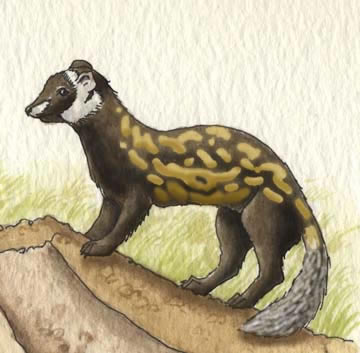


They are found in Europe, Russia, Siberia, China, Bulgaria, Romania, Asia Minor, the Middle East, Pakistan, Yugoslavia, Mongolia, and Egypt.
They live in open, dry, rocky country. They can be found in semi-desert, low hills, scrub forest and steppes but not usually mountainous areas. They have adapted to life in farming areas.
They have long thin bodies with short legs and sharp claws. They have a long fluffy tail. They have brown and yellow mottled spots all over their back and a yellow band around their tail. Their faces are dark with a white muzzle and a white band above the eyes and on the tops of the ears, which are large.
They live alone except to mate. If they feel threatened they will hiss and shriek, baring their teeth. They also release a bad smell, like others in their family (skunk and weasel). They are great diggers.
They eat small mammals (like mice and squirrels), birds, lizards, frogs, insects and plants and fruit (omnivores).
Man in their main hunter, though they can be taken by foxes or wild cats.
Like many of the animals in their family (mustelids), marbled polecats have "delayed implantation." That means that even though they all mate in the spring, they deliver their young at different time, depending on how the weather and food conditions are. They have up to 8 cubs.
Unknown.
Kingdom: Animalia
Phylum: Chordata
Class: Mammalia
Order: Carnivora
Family: Mustelidae
Subfamily: Mustelinae
Genus: Vormela
Species: Vormela peregusna
When you research information you must cite the reference. Citing for websites is different from citing from books, magazines and periodicals. The style of citing shown here is from the MLA Style Citations (Modern Language Association).
When citing a WEBSITE the general format is as follows.
Author Last Name, First Name(s). "Title: Subtitle of Part of Web Page, if appropriate." Title: Subtitle: Section of Page if appropriate. Sponsoring/Publishing Agency, If Given. Additional significant descriptive information. Date of Electronic Publication or other Date, such as Last Updated. Day Month Year of access < URL >.
Amsel, Sheri. "Polecat (Marbled)" Exploring Nature Educational Resource ©2005-2024. December 13, 2024
< http://exploringnature.org/db/view/Polecat-Marbled >
